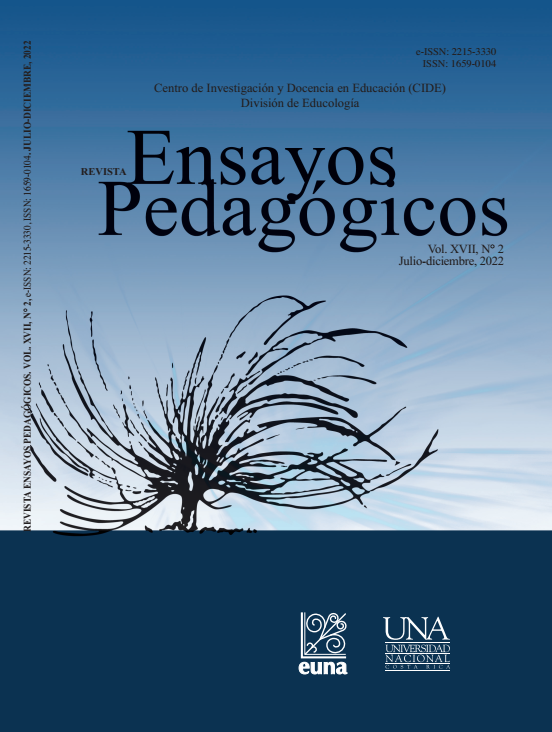Equal Access to American Higher Education: Reality or Fiction?
DOI:
https://doi.org/10.15359/rep.17-2.4Keywords:
higher education, equity, United States, social justiceAbstract
American democratic values and ideals affirm that all people have the same chance of success regardless of race, ethnicity, or gender. The equal opportunities that all students must have do not apply to all educational institutions in this country. Leadership theory, instructional as well as evaluative practices have had and still have a great impact on this inequality. In this regard, educational leaders need to put a brake on the policy they are enforcing to balance resources and provide everything needed for an education tailored to all social classes. Higher education should be the means of educating a multicultural society where neither color, race, origin, nor the gender of people comes first. Educational equity must be present in each of the institutions to offer the educated equal opportunities to seek universal social justice.
References
Boyce, A. S. (2017). Lessons learned using a values-engaged approach to attend to
culture, diversity, and equity in a STEM program evaluation. Evaluation and
Program Planning, 64, 33-43. https://doi.org/10.1016/j.evalprogplan.2017.05.018
Cantwell, B. (2016). The new prudent man: Financial-academic capitalism and
inequality in higher education. En S. Slaughter y B. Taylor (eds.), Higher education, stratification, and workforce Development: Higher dynamics, vol 45 (pp. 173-192). Springer, Cham. https://doi.org/10.1007/978-3-319-21512-9_9
Carnevale, A. P. y Strohl, J. (2013). Separate and Unequal: How Higher Education
Reinforces the Intergenerational Reproduction of White Racial Privilege. Georgetown Public Policy Institute. https://1gyhoq479ufd3yna29x7ubjn-wpengine.netdna-ssl.com/wp-content/uploads/SeparateUnequal.FR_.pdf
Formichellav, M. M. y London, S. (2013). Empleabilidad, educación y equidad
social. Revista de Estudios Sociales, 47, 79-91. https://revistas.uniandes.edu.co/doi/pdf/10.7440/res47.2013.06
Giroux, H. A. (2016). La educación superior y las políticas de ruptura. Revista Entramados: Educación y Sociedad, 3(3), 15-26. https://fh.mdp.edu.ar/revistas/index.php/entramados/article/view/1615/1614
Gopalan, M. (2019). Understanding the Linkages between Racial/Ethnic Discipline
Gaps and Racial/Ethnic Achievement Gaps in the United States. Education Policy Analysis Archives, 27(154), 1-33. https://doi.org/10.14507/epaa.27.4469
Libassi, C. J. (2018). The Neglected College Race Gap: Racial Disparities Among
College Completers. Center for American Progress. https://vtechworks.lib.vt.edu/bitstream/handle/10919/92675/CollegeCompletionsHispanicBlack.pdf?sequence=1&isAllowed=y
NPBEA. (2015). Professional Standards for Educational Leaders.
Nichols, A. H. y Evans-Bell, D. (2017). A Look at Black Student Success: Identifying
Top- and Bottom-Performing Institutions. The Education Trust. http://hdl.handle.net/10919/83663
Page, B. I., y Jacobs, L. R. (2009). Class war?: what Americans really think about economic inequality. University of Chicago Press.
Page, B. I., Bartels, L. M. Seawright, J. (2013). Democracy and the policy preferences of wealthy Americans. Perspectives on Politics, 11(1), 51-73. https://doi.org/10.1017/S153759271200360X
Sandoval, C. P. (2011). Desigualdad educativa y la necesidad de un enfoque de
justicia social en la formación docente. Cisma: Revista del Centro Telúrico de Investigaciones Teóricas, 1(2), 1-20. https://dialnet.unirioja.es/descarga/articulo/3801362.pdf
Taylor, B. J. (2016). The field dynamics of stratification among US research
universities: The expansion of federal support for academic research, 2000–2008. En S. Slaughter y B. Taylor (eds.), Higher education, stratification, and workforce development Higher dynamics, vol 45 (pp. 59-79).https://doi.org/10.1007/978-3-319-21512-9_4
Taylor, B. J. y Cantwell, B. (2018). Unequal higher education in the United States:
Growing participation and shrinking opportunities. Social Sciences, 7(9), 167. https://doi.org/10.3390/socsci7090167
U.S. Department of Commerce, Census Bureau (2019). Current Population Survey (CPS),
Education Statistics. https://www.census.gov/topics/population.html
U.S. Department of Commerce, Census Bureau (2017). Current Population Survey (CPS),
“Annual Social and Economic Supplement,” https://www.census.gov/data/tables/2017/demo/education-attainment/cps-detailed-tables.html
U.S. Census Bureau (2019). Current Population Survey, Annual Social and Economic
Supplement. https://www.census.gov/data/datasets/time-series/demo/cps/cps-asec.2019.html
U.S. Census Bureau. (2017). American Community Survey.
https://www.census.gov/library/stories/2019/05/college-degree-widens-gender-earnings-gap.html
Westwood, P. A. (2016). Igualdad de oportunidades en educación superior: una
discusión sobre la implementación del Sistema de Ingreso Prioritario de Equidad Educativa en la Universidad de Chile. Revista Pedagogía Universitaria y Didáctica del Derecho, 3(1), 62-73. https://ultimadecada.uchile.cl/index.php/RPUD/article/view/41914/43583
Young, M. (2019). Desarrollo y formación en liderazgo educativo: historia y prácticas
contemporáneas en Estados Unidos. En J. Weinstein y G. Muñoz (eds.),Cómo cultivar el liderazgo educativo: Trece miradas (pp. 35-83). Ediciones Universidad Diego Portales. https://liderazgoeducativo.udp.cl/cms/wp-content/uploads/2020/04/Libro13miradas.pdf
Published
How to Cite
Issue
Section
License
Ensayos Pedagógicos is subscribed to the Attribution-NonCommertial-NoDerivatives 4.0 International Creative Commons Licence, which allows both authors and readers to freely download, store, copy, and distribute the final approved publisehd version of the manuscript (post-print) as long as this is done without commercial purposes, no derivative works are generated, and the source and author are mentioned. As well, Ensayos Pedagógicos declares that authors will remain the rightful owners of the copyrights of their work in perpetuity.







